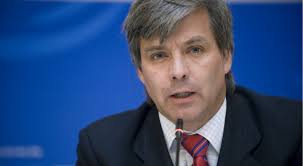By Andrew Warshaw
July 14 – Harold Mayne-Nicholls, the FIFA-appointed official who led the inspection team that evaluated the credentials of all 2018 and 2022 World Cup bidding candidates, is free to resume his career in football after the Court of Arbitration for Sport cut his ban for seeking unpaid intern work in Qatar for relatives to two years.
Because of the ruling, the former Chilean Football Association president has served his time, his original seven-year ban for “repeatedly asking for personal favours” from the Qataris having already been trimmed to three years by the FIFA appeals committee.
The initial ethics committee ban imposed on the 56-year-old was handed down after an email exchange came to light showing he requested possible work placements for his son and a nephew at the famed Aspire youth academy in Doha. Aspire was strongly linked to Qatar’s successful 2022 World Cup bid and FIFA’s ethics judging chamber took the view that Mayne-Nicholls had seriously violated his responsibilities, hitting him with breaches of four articles of the ethics code.
Ethics judges were anxious at the time to send out a strong message that Mayne-Nicholls, as head of the technical inspection team, had a special responsibility in terms of neutrality and that anything which could potentially endanger the independent evaluation of World Cup bidders was a serious conflict of interest – not least actively asking for personal favours with those close to a bid committee, regardless of the outcome of such communication.
FIFA’s then chief ethics judge Hans-Joachim Eckert – ousted in May by Gianni Infantino’s FIFA Council – is understood to have personally felt that the unique position Mayne-Nicholls held meant he had to be given a severe sanction. Yet whilst his conduct was incredibly naive given the sensitivity of the World Cup bid process, he has long insisted he did not in any way benefit personally – unlike other FIFA officials banned for a similar length of time for far worse offences.
Even more significantly, the report delivered by Mayne-Nicholls’ six-member technical inspection team gave Qatar the worst ranking of all the candidates for the 2022 World Cup saying it was a “high risk” option. That this advice was ultimately ignored by the FIFA executive committee was hardly something that could be blamed on the Chilean.
Mayne Nicholls, who has spent the last few years running a sport-related charity in Chile. always felt he had been harshly treated and grew increasingly frustrated that it took 10 months to release the written grounds for his punishment which held up his CAS appeal.
But now he has been partially vindicated as CAS agreed the punishment didn’t fit the crime, shaving another year off the ban and saying that a two-year sanction “represented an appropriate and proportionate penalty.”
Contact the writer of this story at moc.l1734908135labto1734908135ofdlr1734908135owedi1734908135sni@w1734908135ahsra1734908135w.wer1734908135dna1734908135
CAS statement:
** The Court of Arbitration for Sport (CAS) has issued its decision in the arbitration procedure between Harold Mayne-Nicholls and the Fédération Internationale de Football Association (FIFA).
The decision of the FIFA Appeal Committee dated 22 April 2016 is set aside and replaced by the following decision:
- a) Harold Mayne-Nicholls is guilty of violating Articles 13, 15 and 19 of the FIFA Code of Ethics 2012.
- b) Harold Mayne-Nicholls is not guilty of violating Article 20 of the FIFA Code of Ethics 2012.
- c) Harold Mayne-Nicholls is banned for a period of two years from 3 July 2015.
Consequently, Harold Mayne-Nicholls’s ban from taking part in any football-related activity at national and international level has been served in its entirety.
Harold Mayne-Nicholls, the former President of the Chilean Football Association and former Chairman of the FIFA Evaluation Group for the 2018 and 2022 FIFA World Cup bids, was investigated by the FIFA Ethics Committee for breaches of the FIFA Ethics Code arising from requests he made to an organisation linked to the Qatari bid team for the 2022 World Cup on behalf of members of his family and athletes from Chile.
On 6 July 2015, the FIFA Ethics Committee issued a decision in which Harold Mayne-Nicholls was banned from participating in any football-related activity at national and international level for seven years. Harold Mayne-Nicholls appealed this decision to the FIFA Appeal Committee (FIFA AC) which issued a decision on 22 April 2016 reducing the ban from participating in any football-related activity at national and international level from seven years to three years.
The written grounds for the decision were notified on 8 February 2017. On 27 February 2017, Harold Mayne-Nicholls filed an appeal at CAS against the FIFA AC decision.
The CAS arbitration was conducted by Prof. Dr. Martin Schimke, Germany (President), Mr Bernard Hanotiau, Belgium, and Prof. Luigi Fumagalli, Italy.
The Panel held a hearing with the parties at the CAS Headquarters in Lausanne, Switzerland on 14 June 2017. In its decision, the CAS Panel confirmed the finding in the FIFA AC decision that Harold MayneNicholls was guilty of violating Articles 13 (General rule of conduct), 15 (Loyalty) and 19 (Conflict of interests) of the FIFA Code of Ethics 2012.
However, it did not confirm the violation of Article 20 (Offering and accepting gifts and other benefits). Having given careful and anxious consideration to the nature of the wrongdoing that Mr Harold Mayne Nicholls has been found guilty of, the Panel concluded that a two-year prohibition on participating in any football-related activity represented an appropriate and proportionate penalty.

